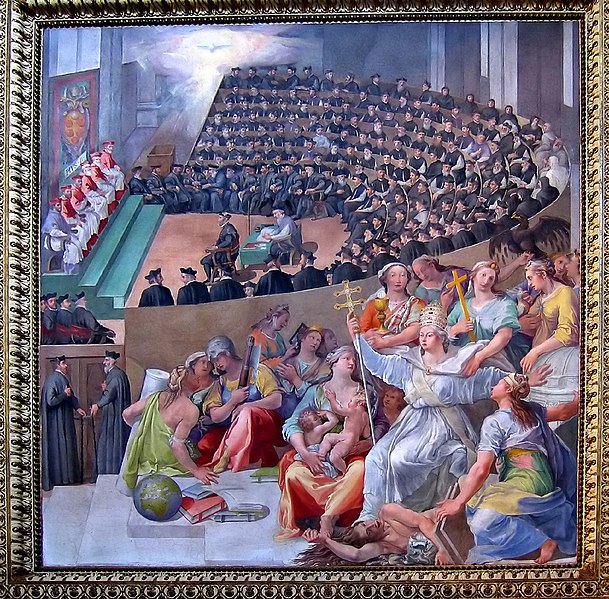March 15th is a date etched with significant events spanning centuries and continents. From political upheavals to cultural milestones, this day encapsulates pivotal moments that have left indelible marks on our collective history.
Join us as we explore a curated selection of 20 notable events that illuminate the diverse tapestry of human experience on this remarkable day.
March 15th Events in History
44 BC – The Ides of March: Julius Caesar, Dictator of the Roman Republic, is stabbed to death in the Roman Senate
The Ides of March marks the date of the assassination of Julius Caesar, the Dictator of the Roman Republic, in 44 BC. Caesar was stabbed to death at a meeting of the Senate in the Theatre of Pompey by a group of senators who called themselves the Liberators.
Also Read: March 14 – On this Day in History
Among them were Marcus Junius Brutus and Gaius Cassius Longinus, motivated by a desire to prevent Caesar’s alleged monarchic ambitions and restore the Republic’s traditional government. Caesar’s death led to a power vacuum, ensuing civil wars, and eventually the rise of the Roman Empire under Augustus.

493 – Odoacer, the first Barbarian King of Italy, is slain by Theodoric the Great, the King of the Ostrogoths, ending the first phase of the Gothic War
Odoacer was the first Barbarian King of Italy, who took power after deposing the last Western Roman Emperor, Romulus Augustulus, in 476 AD. In 493, Theodoric the Great, the King of the Ostrogoths and a commissioned ally of the Eastern Roman Empire, invaded Italy.
Also Read: March 16th Events in History
After several years of conflict, Theodoric and Odoacer agreed to rule Italy jointly, but at a banquet intended to celebrate this agreement, Theodoric killed Odoacer. This act eliminated Odoacer as a rival and established Theodoric’s rule over Italy, marking the beginning of the Ostrogothic Kingdom.
1311 – The Catalan Company defeats Walter V of Brienne to take control of the Duchy of Athens, a Crusader state in Greece
The Catalan Company was a mercenary group of soldiers, originally hired by the Byzantine Empire to fight the Turks. However, in 1311, they turned their focus towards the Duchy of Athens, a Crusader state in Greece, and defeated Walter V of Brienne in the Battle of Halmyros.
This victory allowed the Catalans to seize control of the duchy, marking a significant shift in power in the region. The Catalan Company ruled Athens for several decades, during which they imposed their own governance and influenced the cultural and military landscape of the region.
1493 – Christopher Columbus returns to Spain after his first voyage to the New World
After his first voyage across the Atlantic Ocean in 1492, Christopher Columbus returned to Spain on March 15, 1493. This voyage, sponsored by the Spanish monarchs Ferdinand and Isabella, led to the European discovery of the New World.
Columbus’s return was met with much excitement, and he was received as a hero. He brought back with him gold, spices, and captives from the islands he explored in the Caribbean.
His reports would fuel the European imagination and lead to further expeditions to the Americas, profoundly impacting the history of the world through the ensuing centuries of exploration, colonization, and cultural exchange.
1545 – The first session of the Council of Trent opens, initiating the Counter-Reformation
The Council of Trent was convened in response to the Protestant Reformation and is considered one of the Catholic Church’s most important ecumenical councils.
Opening on December 13, 1545, and spanning over 18 years in various sessions, the council aimed to address issues of church reform and to clarify Catholic doctrine.
The council made significant decrees on the sacraments, the biblical canon, and clerical discipline, among other topics. It played a crucial role in the Counter-Reformation, helping to rejuvenate the Catholic Church by correcting abuses and solidifying its doctrines and practices.

1767 – Seventh President of the United States, Andrew Jackson, is born
Andrew Jackson, the seventh President of the United States, was born on March 15, 1767, in the Waxhaws region bordering North and South Carolina.
Jackson was a key figure in American history, known for his significant contributions as a military hero during the War of 1812, notably for his victory in the Battle of New Orleans.
As president, he was known for his populist approach and policies, including the controversial Indian Removal Act, which led to the Trail of Tears. Jackson’s presidency marked the emergence of the modern Democratic Party and a shift towards greater presidential power.
1820 – Maine becomes the 23rd U.S. state
On March 15, 1820, Maine was admitted to the Union as the 23rd state as part of the Missouri Compromise. Before statehood, Maine had been a district of Massachusetts since 1652.
The Missouri Compromise was a significant legislative effort to balance the power between free and slave states, allowing Missouri to enter the Union as a slave state and Maine as a free state.
This compromise was one of the early attempts to address the growing sectional tensions over slavery that would eventually lead to the American Civil War.
1917 – Tsar Nicholas II of Russia abdicates the throne ending the 304-year-old Romanov dynasty
The abdication of Tsar Nicholas II on March 15, 1917, marked the end of the Romanov dynasty’s 304-year rule over Russia and was a pivotal event in the Russian Revolution.
Faced with widespread discontent exacerbated by military defeats in World War I, economic hardship, and calls for reform, Nicholas II was forced to abdicate the throne, ending the Russian Empire.
His abdication led to the establishment of a provisional government, which was later overthrown by the Bolsheviks in the October Revolution, leading to the creation of the Soviet Union.
1922 – After Egypt gains nominal independence from the United Kingdom, Fuad I becomes King of Egypt
After Egypt gained nominal independence from the United Kingdom in 1922, Fuad I ascended the throne as King of Egypt. His reign marked the beginning of modern Egyptian monarchy under the Sultanate and then the Kingdom of Egypt.
Fuad I’s reign was characterized by efforts to modernize the state and navigate the complexities of British influence and internal reform. His era also saw the struggle for a constitution and greater national independence, laying the groundwork for Egypt’s future political developments.
1939 – German troops occupy the remaining part of Bohemia and Moravia; Czechoslovakia ceases to exist
On March 15, 1939, German troops occupied the remaining parts of Bohemia and Moravia, effectively dissolving Czechoslovakia. This action was in direct violation of the Munich Agreement signed the previous year, in which Adolf Hitler had promised to respect Czechoslovakia’s new borders.
The occupation marked a significant escalation in Nazi aggression and expansionism ahead of World War II, demonstrating Hitler’s disregard for diplomatic agreements. This event also exposed the failure of the appeasement policy pursued by Britain and France and set the stage for the outbreak of World War II later that year.

1943 – World War II: The Battle of Krasny Bor concludes as part of the Siege of Leningrad
Part of the larger Siege of Leningrad during World War II, the Battle of Krasny Bor was fought on February 10, 1943, but had lasting effects into mid-March. It involved the Spanish Blue Division, aligned with Nazi Germany, against the Soviet forces aiming to break the siege.
The battle was characterized by intense combat and significant casualties on both sides. Although the Soviets did not achieve a breakthrough, the battle marked a critical point in the Soviet attempts to lift the siege of Leningrad, which had begun in 1941 and caused widespread famine and destruction in the city.
The siege would not be fully lifted until January 1944, but battles like Krasny Bor were key in weakening the encircling forces.
1956 – My Fair Lady premieres on Broadway
“My Fair Lady,” a musical based on George Bernard Shaw’s “Pygmalion,” premiered on Broadway on March 15, 1956. With music by Frederick Loewe and lyrics and book by Alan Jay Lerner, the production was an instant hit, praised for its witty dialogue, enchanting music, and the performances of its leads, Rex Harrison and Julie Andrews.
The story of Eliza Doolittle, a Cockney flower girl who is transformed into a refined lady, captured the public’s imagination. The musical won six Tony Awards, including Best Musical, and its original Broadway production was a significant success, leading to several revivals, a popular film adaptation, and enduring status as one of the greatest musicals in theater history.
1961 – South Africa withdraws from the Commonwealth of Nations
On March 15, 1961, South Africa announced its withdrawal from the Commonwealth of Nations following a dispute over its policy of racial segregation known as apartheid. The country had been a founding member of the organization, but its racial policies led to growing international criticism and opposition.
The decision to withdraw was made after other Commonwealth countries, especially newly independent African nations, pressured for South Africa’s expulsion or for it to renounce apartheid.
South Africa’s departure marked a significant moment in the international opposition to apartheid, which would continue until the system’s end in the early 1990s. South Africa would later rejoin the Commonwealth in 1994, following the end of apartheid and the election of Nelson Mandela.
1972 – The Godfather, a film directed by Francis Ford Coppola and starring Marlon Brando and Al Pacino, premieres in New York City
“The Godfather,” directed by Francis Ford Coppola and based on the novel by Mario Puzo, premiered in New York City on March 15, 1972. Starring Marlon Brando, Al Pacino, and James Caan, it became one of the most iconic films in American cinema.
The movie, depicting the complex dynamics of the Corleone mafia family, was acclaimed for its direction, performances, and deep exploration of themes like power, family, and the American Dream.
It won three Academy Awards, including Best Picture, and its success spawned two sequels, creating one of the most celebrated film trilogies in history. “The Godfather” has had a lasting impact on film and popular culture and is often cited as one of the greatest films of all time.
1985 – The first Internet domain name is registered (symbolics.com)
On March 15, 1985, the first Internet domain name, symbolics.com, was registered by Symbolics, Inc., a computer manufacturer based in Cambridge, Massachusetts. This marked the beginning of the domain name registration system that would become a fundamental component of the Internet’s infrastructure.
The registration of domain names allowed for easier navigation and the establishment of distinct online identities, paving the way for the growth of the World Wide Web. The introduction of domain names was a crucial step in making the Internet more accessible and user-friendly, leading to the vast, interconnected digital landscape we know today.
1990 – Mikhail Gorbachev is elected as the first President of the Soviet Union
On March 15, 1990, Mikhail Gorbachev was elected as the first — and ultimately the last — President of the Soviet Union by the Congress of People’s Deputies. Prior to this, Gorbachev had been serving as the General Secretary of the Communist Party of the Soviet Union, a role with significant control over the state.
His presidency marked a pivotal point in Soviet and world history, characterized by his policies of glasnost (openness) and perestroika (restructuring), which aimed at reforming the Soviet political and economic system.
Gorbachev’s leadership saw significant reforms that led to the end of the Cold War, the fall of the Berlin Wall, and ultimately, the dissolution of the Soviet Union in 1991.
2003 – Hu Jintao becomes President of the People’s Republic of China
Hu Jintao took office as the President of the People’s Republic of China on March 15, 2003, succeeding Jiang Zemin. His presidency was noted for China’s continued economic growth and further integration into the global economy.
Hu emphasized the concept of “scientific development,” which sought to promote sustainable economic growth with a more equitable distribution of wealth and resources.
He was also known for his policies on rural development, healthcare, and education reform, as well as for maintaining a hard stance on issues related to Taiwan and Tibet. Hu Jintao’s leadership saw China becoming an increasingly significant global power, economically and politically.
2011 – Beginning of the Syrian Civil War
The Syrian Civil War began in the early spring of 2011 with protests in the city of Daraa, escalating from demands for government reform to an outright rebellion against the regime of Bashar al-Assad.
The government’s violent response to the protests, including the use of live ammunition against demonstrators, sparked outrage and led to widespread unrest across the country.
The conflict quickly evolved into a complex war involving multiple factions, including rebel groups, extremist militants, and foreign powers, with significant humanitarian consequences. The war has led to hundreds of thousands of deaths, massive displacement of the Syrian population, and extensive destruction across the country.
2019 – A category 4 cyclone, Cyclone Idai, makes landfall in Mozambique, causing over 1000 deaths across Southern Africa
On March 15, 2019, Cyclone Idai, a Category 4 storm, made landfall near the city of Beira in Mozambique. It was one of the worst tropical cyclones to ever hit Africa, causing widespread destruction in Mozambique, Zimbabwe, Malawi, and Madagascar.
The cyclone led to catastrophic flooding, killed over 1,000 people, and left hundreds of thousands homeless, along with causing extensive damage to infrastructure and agriculture.
The international community responded with humanitarian aid, but the disaster highlighted the challenges of disaster preparedness, response, and climate change mitigation in the region.
2023 – Global protests for climate change action mark one of the largest coordinated efforts for environmental advocacy in recent years
In a coordinated effort seen around the world on March 15, 2023, millions of people took to the streets to demand action on climate change.
Inspired by youth movements and fueled by the growing urgency of the climate crisis, these protests called for governments and corporations to take immediate, substantive steps to reduce carbon emissions and to invest in sustainable, renewable energy sources.
The protests were part of a series of global climate strikes, showing the increasing public concern over environmental degradation, extreme weather events, and the need for systemic change to address the global climate emergency.
